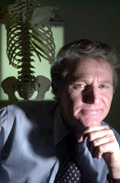Dr David McGrath
Spine Physician
MB BS (Hons) FAFOM, RACP, FAFMMMaster of Pain Medicine
Specific emotions often come to dominate behaviour, either in a particular environment, or in most environments. When this occurs, we can recognise, in the first instance, the "mood" and in the second a "personality". A person who switches often, is sometimes termed "moody", while an unresponsive person is "depressed".
What are the drivers or causes behind these emotional states ?
We have already seen, that success is a function of both the emotional state and the environment. In addition, new emotions are triggered by the disturbances supported by those emotions. If we could grasp the mathematics of those statements, we might understand a deep psychological point, with relevence to the happiness of mankind.
Let's experiment with some notions, looking for insight.
Under what conditions,would it pay to have a dominant emotion ? Would I be better off in some circumstances, if I was perpetually angy or sad or curious ?
In (Part 1) of this series, I postulated that emotional variety was the better situation, which if corrupted, would leave a person worse off. The main assumption for that conclusion, was that each emotion was better than the null emotion. (default depression)
There might be situations, when doing nothing, as generated by depression is superior to active emotions. This might change the balance towards one dominant emotion, which had a minor advantage over depression.
| EmotionSuccess | Success | Failure |
| Dominant Emotion (eg anger) | 20 | 80 |
| Emotion A | 3 | 97 |
| Emotion B | 7 | 95 |
| Depression (default emotion ) | 10 | 90 |
The overall success is 40/400
In this situation, the poor success of emotions A and B, indicate that, the individual would be better off , if actions generated by depression were used instead. This would improve the success odds to
50/400.
| EmotionSuccess | Success | Failure |
| Dominant Emotion (eg anger) | 20 | 80 |
| Emotion A | 0 | 0 |
| Emotion B | 0 | 0 |
| Depression (default emotion ) | 30 | 270 |
Now we have, a dominant active emotion (eg anger ) combined with a default non-emotion (depression). An angy, depressed person is more successful in this environment, than one with a greater emotional spectrum.
This conclusion, has a clinical resonance. It is not uncommon to see depressed individuals, with an underlying anger or sadness. The more positive emotions are simply not working for them. Anger and sadness can generate some small social success.
©Copyright 2007 Dr David McGrath. All rights reserved

